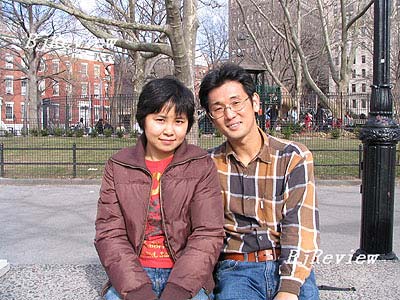| Home / China-Japan Year of Cultural & Sports Exchanges / News | Tools: Save | Print | E-mail | Most Read |
| Two Cultures Unite in a Family |
| Adjust font size: |
By Chen Wen They look just like any other average young Chinese couple when you first meet them in
Dong Wei, now in her mid-20s, was born and raised in northeast "I had hoped to see the world as much as possible when I was young," Dong said. "When I first met him in 2001, he was exactly like who my 'dream husband' should be," Dong recalled. Pressed to describe "dream husband" qualities, she simply said, "You know, everything about him just fits well." Hirata, a self-described "typical Japanese guy," felt the sting of Cupid's arrows as well. Dong was "cute," and the two hit it off immediately. As the song goes: first comes love, then comes marriage. Their wedding took place in A culture clash is what most think of when imagining cross-national marriages, especially two countries with a painful history of war. Differences gain more scrutiny than similarities in upbringing. Dong and Hirata said they too could see the differences despite their honeymoon haze. Hirata said he began to notice most the difference in dining habits. It was simple, little things: the manner of dining, the way of placing chopsticks, and the use of various dishes. "These cultural differences were kind of fun, not a conflict, and both of us have now gotten used to it," Hirata told Beijing Review. He felt that in his family, the difference between men and women was much bigger than the differences between Japanese and Chinese culture. Dong agreed with her husband on this point. "Marriage is between a man and a woman, not between one country and another," she joked. She also said that though they did run into some differences in their daily habits, they were "no big deal." Not letting 'politics' intrude Sometimes they talked about the painful history between But that's politics, the couple said. The real issues of life are daily and mundane, not politics and history lessons. Their life in Unlike many other 25-year-old Chinese women who might rush off for fancy dinners with friends after work, go shopping, travel or enjoy karaoke on the weekends or holidays, Dong spent much less time hanging out with friends and more time at home. Perhaps her life was a little unexciting in her friends' eyes, but she was happy. She attended courses at a university, did housework and prepared food for the family while Hirata went to work. He would leave around 7: Men typically work hard in "It's considered a good thing in She also pointed out that the Japanese have a different attitude or view toward life and family than the Chinese. The Japanese may show much less emotion and affection to their families, but they do love the families very much. Dong said she acclimated herself well to Japanese society and culture. Despite this, it may have come as a surprise even to her that Hirata found that she had many similarities to a traditional Japanese bride, unlike many modern young women in "In that aspect, she still keeps the traditional personality which I expected in a wife," Hirata said. Now living in They will return to (Beijing Review, reporting from |
| Tools: Save | Print | E-mail | Most Read |
 |
| Related Stories |
 |
 |
|
 |
| Links |
